Federal Council (Switzerland)
Since after World War II, the Federal Council is by convention a permanent grand coalition government composed of representatives of the country's major parties and language regions.The President of the Swiss Confederation chairs the council, but exercises no particular authority; rather, the position is one of a first among equals and rotates among the seven Councillors annually.Only after Emil Welti's resignation in 1891 after a failed referendum on railway nationalisation did the Radicals decide to co-opt the Conservatives by supporting the election of Josef Zemp.It was hastened by the FDP's and CVP's gradually diminishing voter shares, complemented by the rise of new parties of lesser power at the ends of the political spectrum.The governmental balance was changed after the 2003 elections, when the SVP/UDC was granted a council seat for their leader Christoph Blocher that had formerly belonged to the CVP/PDC's Ruth Metzler.Due to controversies surrounding his conduct in office, a narrow Assembly majority did not reelect Blocher in 2007 and chose instead Eveline Widmer-Schlumpf, a more moderate SVP/UDC politician, against party policy.After liberal regional SVP/UDC groups including Federal Councillors Widmer-Schlumpf and Samuel Schmid founded a new Conservative Democratic Party, the SVP/UDC was left in opposition for the first time since 1929, but returned into the council with the election of Ueli Maurer on 10 December 2008, who regained the seat previously held by Schmid, who had resigned.In total, there have been ten female councillors in the period 1989 to present:[9] Until 1999, the Constitution mandated that no canton could have multiple representatives on the Federal Council at the same time.At the 1999 Swiss referendums, the Constitution was changed to require an equitable distribution of seats among the cantons and language groups of the country, without setting concrete quotas.Likewise, no current Federal Councillors grew up in an urban area (with the exception of Karin Keller-Sutter, who spent some school years in Neuchâtel NE).However, in recent practice the president acts and is recognised as head of state while conducting official visits abroad, as the Council (also by convention) does not leave the country in corpore.This is called the co-report procedure (Mitberichtsverfahren/procédure de co-rapport), designed to build a wide consensus ahead of a council meeting.In such cases, the consultation procedure also serves to identify political concerns that could later be the focus of a popular referendum to stop passage of the bill at issue.Due to the Federal Council's unique nature as a voluntary grand coalition of political opponents, its operation is subject to numerous constitutional conventions.Despite the opening of Switzerland due to the Kennedy assassination, foreign travels of Federal Councillors were only normalized after the dissolution of the USSR.Each Federal Council seat is up for (re-)election in the order of seniority, beginning with the Councillor who had the longest term of office.Until the end of the 19th century, it was informally required of Federal Councillors to be elected to the National Council in their canton of origin every four years to put their popularity to a test.While Councillors can draw on an Army security detail if they need personal protection, in particular during official events, they are often encountered without any escort in the streets, restaurants and tramways of Bern.[22] Councillors are also entitled to a personal bailiff (huissier or Bundesweibel) who accompanies them, in a red and white ceremonial uniform, to official events.[24] Former councillors with at least four years of service receive a pension equivalent to half the salary of Federal Council members in office."[24] Federal Councillors, like members of parliament, enjoy absolute legal immunity for all statements made in their official capacity.[25] Prosecution for crimes and misdemeanors that relate to the Councillors' official capacity requires the assent of the immunity commissions of the Federal Assembly.

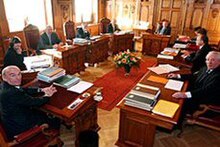
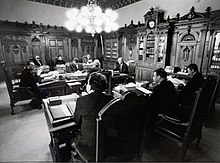
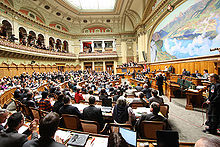

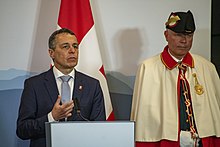

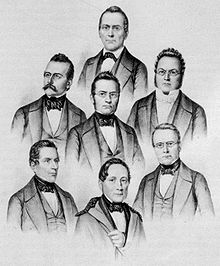
Viktor RossiChancellorIgnazio CassisÉlisabeth Baume-SchneiderKarin Keller-SutterPresidentAlbert RöstiGuy ParmelinBeat JansViola AmherdHis/Her ExcellencyHead of stateHead of governmentFederal AssemblyTerm lengthUlrich OchsenbeinJonas FurrerMartin J. MunzingerHenri DrueyFriedrich Frey-HeroséWilhelm Matthias NaeffStefano FransciniPolitics of SwitzerlandConstitutionHuman rightsMembersFederal ChancellorFederal administrationCouncil of StatesNational CouncilPolitical partiesElectionsVotingReferendumsMandatoryOptionalPopular initiativeFederal courtsFederal Supreme CourtFederal Criminal CourtFederal Administrative CourtFederal Patent CourtForeign relationsEuropean UnionCantonsAppenzell Ausserrhoden (AR)Appenzell Innerrhoden (AI)Aargau (AG)Basel-Landschaft (BL)Basel-Stadt (BS)Bern (BE)Fribourg (FR)Geneva (GE)Glarus (GL)Grisons (GR)Jura (JU)Lucerne (LU)Neuchâtel (NE)Nidwalden (NW)Obwalden (OW)Schaffhausen (SH)Schwyz (SZ)Solothurn (SO)St. Gallen (SG)Ticino (TI)Thurgau (TG)Uri (UR)Valais (VS)Vaud (VD)Zug (ZG)Zurich (ZH)Cantonal legislaturesCantonal executivesLandsgemeindeMunicipalities(Full list of Municipalities)AargauBasel-LandschaftBasel-StadtFribourgGenevaGlarusGraubündenLucerneNeuchâtelNidwaldenObwaldenSchaffhausenSchwyzSolothurnSt. GallenThurgauTicinoValaisZurichcabinetSwiss Confederationgovernmentgrand coalitioncountry's major partieslanguage regionsfederal administration of SwitzerlandPresident of the Swiss Confederationfirst among equalsFederal Council is electedFederal Assembly of Switzerlandfederal parliamentary electionrecallvote of no confidenceterm-limitedSwiss People's PartyFederal Department of Economic Affairs, Education and ResearchLiberalsFederal Department of Foreign AffairsCentreFederal Department of Defence, Civil Protection and SportFederal Department of FinanceFederal Department of Environment, Transport, Energy and CommunicationsSocial Democratic PartyFederal Department of Home AffairsFederal Department of Justice and PoliceFederal Constitutionconstitutional democracyUnited States Constitutioncollegialdirectorial system